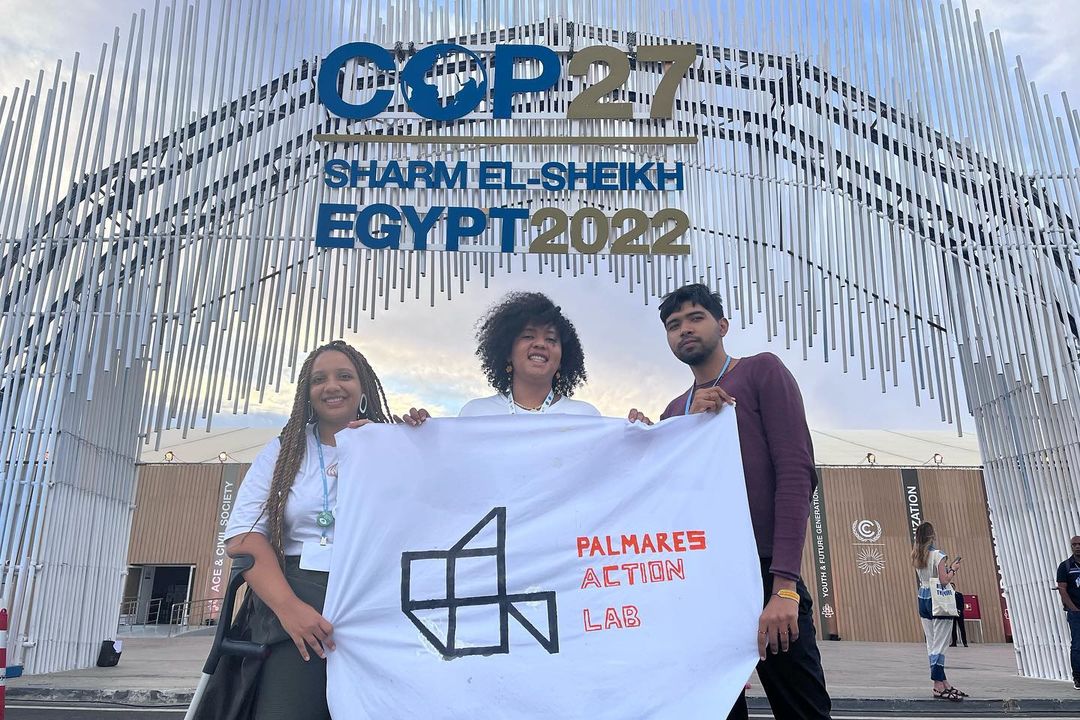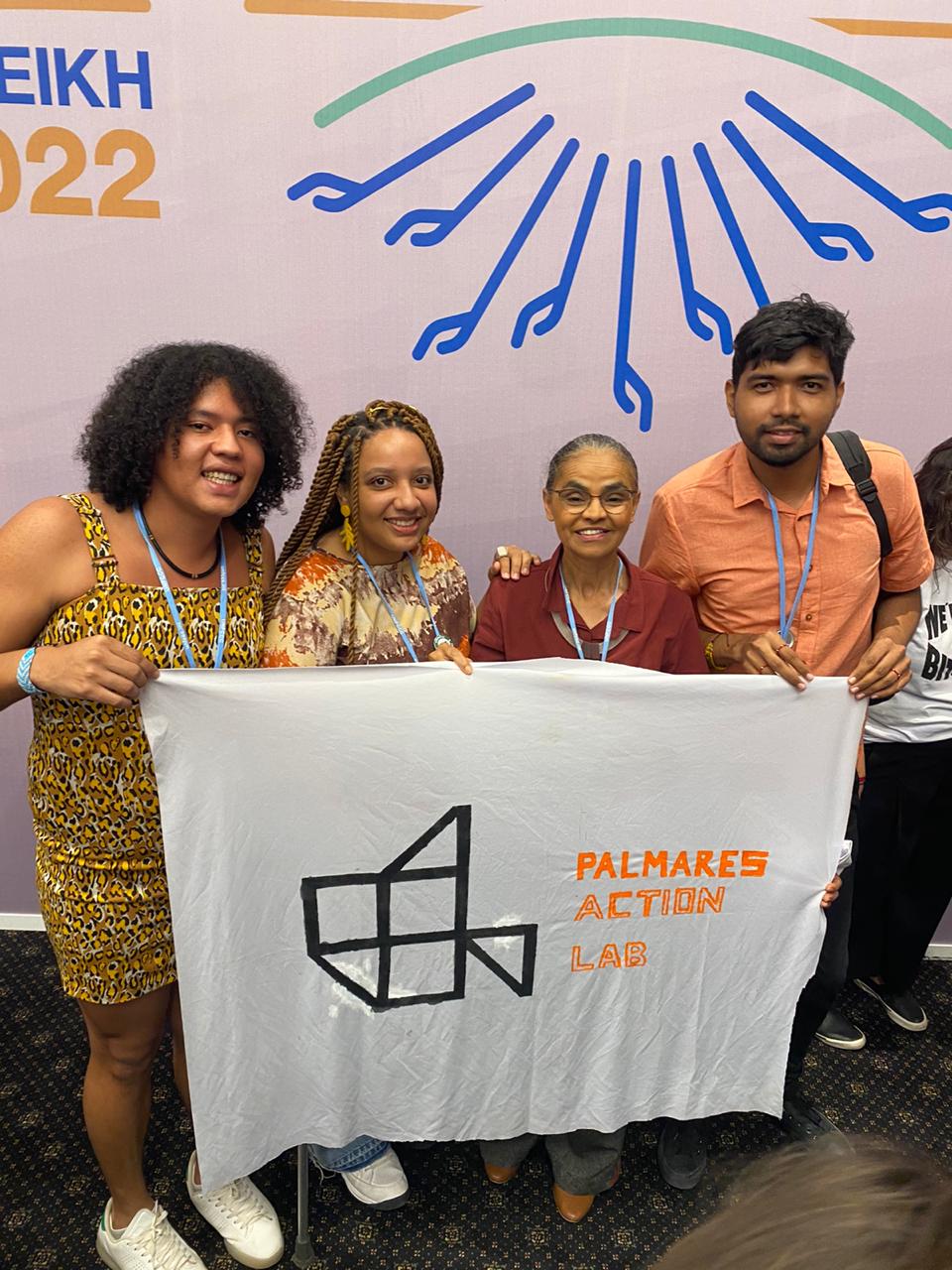Palmares Laboratório-Ação: voices from the periphery of the Amazon
From Zumbi, in Manaus, Palmares Laboratório-Ação represents the demands of peripheral Amazonian youths


Credit: Disclosure
By: Nicoly Ambrosio – Lupa do Bem / Favela em Pauta
Created on the outskirts of Manaus, Palmares Laboratório-Ação (Palmares Laboratory-Action) is the result of a movement of – at least – seven years led by Amazonian activist and researcher Vitória Pinheiro. Initiated in social and climate activism based on her experiences in the Zumbi dos Palmares neighbourhood, on the east side of the city, the young woman is the organization’s executive director and defines it as a project that “thinks and creates solutions for social justice and defends public policies for peripheral youth across the country”.
Palmares’ agendas establish, mainly, the demand for representativeness of trans, black, indigenous and peripheral bodies in decision-making contexts. “We, black and peripheral people, are aware of the struggles that permeate us and I want to show people how they can do something for themselves. We don’t need to depend on rulers who have never been there. The demand for public policies can be community-based,” says Vitória.
For Jean Ferreira, an active member at Palmares, collective work cooperates in the fight against inequalities. “The more we advance within a global agenda, the more our need to act in our territory increases, we automatically become representatives, mirrors. Even if this is a lot of responsibility, we understand and try to create new projects that prioritize the participation of our people”, he concludes.
The Laboratório-Ação is a term coined, according to Vitória, as a way of designating a space where data and knowledge are produced that will be transformed into social actions in the future.
“We are action because we want this to return to the places where we come from and work, because these are places that need the generation of knowledge and, above all, action based on that knowledge”, he says.
Periphery in power
Palmares’ initiatives focus on generating income for peripheral Amazonian youth, and today the organization develops, through fintech Digna, work for black youth, LGBTs and immigrants.
Another central point of the Lab’s work is the climate change and environmental justice agenda, a topic that directly impacts Amazonian youth since these populations have historically suffered from the lack of sustainable public policies.
“It is in the cities where we are going to feel these changes the most and it is exactly these groups of children, young people and women from the periphery that are going to be more exposed to these consequences, precisely because they already live in situations of inequality”, says Vitória. “And when we talk about inequality, we talk about the lack of access to basic services related to citizenship, such as education, health, food, but mainly the right to a safe environment so that this development can happen”, she concludes.
The activist is the only Brazilian nominee to the Focal Point of the United Nations (UN) for 2022. Black, peripheral and transvestite, Vitória represents children and young people in Latin America and the Caribbean.
Its mission is to participate in groups and mobilizations in the Constituent of Children and Youth in Sustainable Communities, a formal UN mechanism that operates in the implementation of measures to advance the objectives of the Sustainable Development Agenda (SDG) and the New Urban Agenda in the North region. from Brazil.
As a function, the Focal Point is to coordinate the performance of groups and collectives that work with initiatives that promote activities for children and young people. Vitória’s work has the objective of inserting this population in spaces of important political decisions, which can impact the communities, already developed through Palmares Laboratório-Ação (Palmares Laboratory-Action).
Palmares at COP 27
For the first time, Palmares managed to form a delegation to obtain accreditation for the United Nations Conference on Climate Change, COP 27.
This was also the first COP on the African continent, held in the city of Sharm El Sheikh, Egypt. Despite being a milestone for the activities of young activists, access was difficult, as reported by Vitória.

“We had many difficulties that were inherent to this edition, first because this COP had a very strong presence of oil and natural gas lobbyists, an action that is happening right there in that area of Egypt”, he denounces. “This year we had less civil society participation and Brazil brought fewer people than last time because many were unable to register for the event with international partners”.
Despite this, the Palmares delegation ended up emerging as a response to the difficulty of Amazonian youths accessing the event. “This reflects in the way we are impacted economically and socially”, says the activist.
In addition to the difficulties, Palmares’ fruitful participation in the COP generated dialogues that demand the creation of a youth council in the northern region, intending to include these people in decision-making in the region.
Another positive aspect of the organization’s participation was a letter drawn up with other organizations of young climate activists. The document was delivered to the governor of Pará, Helder Barbalho, on behalf of the Interstate Amazon Consortium.
“This commitment from all of us, who are seven people, was essential for our performance during the event to be significant for our return and our states. We are back with more projects and more desire to make way for those who have not yet been able to access these spaces. Today, Palmares, together with the organizations of its members, such as Coletivo Miri and Gueto Hub, also create alternative projects to what is established and that sometimes only serves the interests of capital, and not of the people”, says Jean, one of the members of Palmares which was COP 27.
Next steps
For the first half of next year, Palmares intends to organize four satellite events showing its initiatives and how they are producing data. “We want people to know what this data is generating for the territories where we work, in terms of solutions to advance social justice for ours”, projects Vitória.
The organisation seeks funding to maintain its projects and intends to expand to continue working and implementing solutions in public policies.
“Our work is yielding many fruits and in this first semester in Manaus, we will be fulfilling several agendas that mark the launch of our action”, he concludes.
It is possible to follow and contribute to the project through the profile on Instagram, at @palmares.


